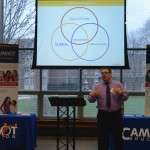Camelot Teacher Profile: Kelby Hunt

Kelby Hunt was selected as Phoenix Academy’s 2014 Teacher of the Year.
Originally from Williamsport, PA Kelby Hunt graduated from Bloomsburg University where he received an undergraduate degree in environmental planning. After spending five years in the research division at PennDot he decided that was not the career path he wanted to follow. “I enjoyed what I was doing, but the best part of my job was always training and teaching new hires,” Kelby explained, “ I decided one day that if that was what I was in to maybe I needed to think about going into teaching.”
Currently in his first year as a Statistics and Advanced Algebra teacher at Phoenix Academy, Kelby was recently selected as the 2014 Teacher of the Year.
You are still in your first year at a Camelot school. What would you say you like about working at Phoenix Academy so far?
Definitely the administration and my co-workers. Everyone is vibrant and they have a thirst to accomplish something. We have a very young staff, but a lot of us have come through alternative routes in to teaching. I really think that enriches our staff. We have so many ideas when we come to a team meeting; everyone has a fresh viewpoint
Everyone is always on the same team and we all work together. There’s a job to be done and we are all there to get it done. You can actually make a big difference in someone’s life here. It’s not always about the mathematics you are mentoring kids as well, and that’s what you have to bring to the table.
What are some challenges?
The biggest challenge initially is classroom management; a lot of the students didn’t succeed in other environments and you have to take that into consideration. A lot of the reason they didn’t succeed is because they didn’t necessarily fit in to that traditional mold. Establishing that classroom management to begin with is so important. Having procedures and everything planned out as much as possible helps tremendously. The Camelot norms are huge in helping with this- they are the bedrock in place.
What is your favorite lesson?
One of my favorite things we do in our statistics class is instead of a test-based final, we do a presentation based final that is more real-world/ real-skills oriented. The students get to pick a topic of their choice. A lot of them, historically, haven’t had a chance to present information in front of a class. Since many of them didn’t even know how to use PowerPoint, it is huge for them to take on a project like this. It also helps them build skills they will need in the real world if they ever need to give a presentation. They’ve really bought-in to a presentation based final. It gives them an opportunity to explore something meaningful to them.
How would you describe your teaching style?
My teaching style is very student centered. I teach math, which is notoriously known for being a subject that everyone seems to hate as much as possible. One of the ways I try to overcome that is by making connections to real life constantly. When I was in school my math teacher would never say ‘this is what we use this for.’ And, I remember thinking why are we even learning this stuff?
When I worked at Penndot in the research division I was evaluating all these proposals that had all these math and stats connections in there and that has helped me tremendously when I have to explain why we are learning how to do slopes and things like that. Kids pick up on that and then they buy into it a lot more.
My lessons, I set it up as an I do, we do, you do model. I start the class with showing them to do something, then we do something together then I slowly release responsibility to them so I can help build their independence.
How would your students describe you?
I’m pretty sure they would say that I have very high expectations for them. But, typically, I expect much more out of them than they initially expect out of themselves.


